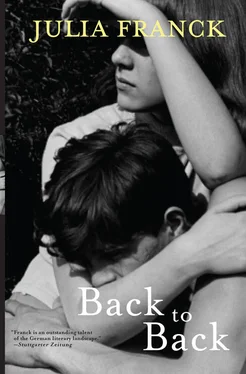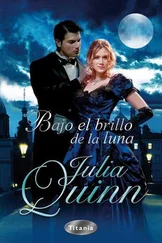Julia Franck - Back to Back
Здесь есть возможность читать онлайн «Julia Franck - Back to Back» весь текст электронной книги совершенно бесплатно (целиком полную версию без сокращений). В некоторых случаях можно слушать аудио, скачать через торрент в формате fb2 и присутствует краткое содержание. Год выпуска: 2013, Издательство: Grove Press, Жанр: Современная проза, на английском языке. Описание произведения, (предисловие) а так же отзывы посетителей доступны на портале библиотеки ЛибКат.
- Название:Back to Back
- Автор:
- Издательство:Grove Press
- Жанр:
- Год:2013
- ISBN:нет данных
- Рейтинг книги:3 / 5. Голосов: 1
-
Избранное:Добавить в избранное
- Отзывы:
-
Ваша оценка:
- 60
- 1
- 2
- 3
- 4
- 5
Back to Back: краткое содержание, описание и аннотация
Предлагаем к чтению аннотацию, описание, краткое содержание или предисловие (зависит от того, что написал сам автор книги «Back to Back»). Если вы не нашли необходимую информацию о книге — напишите в комментариях, мы постараемся отыскать её.
, was an international phenomenon, selling 850,000 copies in Germany alone and being published in thirty-five countries. Her newest work,
echoes the themes of
, telling a moving personal story set against the tragedies of twentieth-century Germany.
Back to Back Heartbreaking and shocking,
is a dark fairytale of East Germany, the story of a single family tragedy that reflects the greater tragedies of totalitarianism.
Back to Back — читать онлайн бесплатно полную книгу (весь текст) целиком
Ниже представлен текст книги, разбитый по страницам. Система сохранения места последней прочитанной страницы, позволяет с удобством читать онлайн бесплатно книгу «Back to Back», без необходимости каждый раз заново искать на чём Вы остановились. Поставьте закладку, и сможете в любой момент перейти на страницу, на которой закончили чтение.
Интервал:
Закладка:
Oh, for God’s sake, take your hand away from your mouth! Käthe’s voice sounded brusque, she took a step towards him and grabbed his arm. Biting your nails the whole time, I’ll tear them right out one of these days if you don’t stop it.
Startled, Thomas looked at his hand; he didn’t notice when he was biting his nails. Even if he was standing in the middle of the room stark naked, as he was now, one hand behind his head, his arm crooked at the correct angle, the fingers of the other hand could land in his mouth without his thinking about it or being able to prevent it. The leg he was standing on hurt, he felt a pulling behind his knees. That was growing pains, he had often been told so over the last few years, and he must hope that his left leg, which was only minimally shorter than his right leg, could still catch up. He wasn’t fully grown yet at sixteen, all kinds of things might happen to him. Thomas was a year younger than Ella, but right at the start he had gone up a year at school, so that they were in the same class. His hair might grow, his leg, his attitude and his obedience. His feet were cold as ice just now, but he knew Käthe wouldn’t let him wear socks — even when she wasn’t working on the feet of her sculpture at all. She needed a clear view of human anatomy, she claimed.
Käthe looked at the boy critically. You must watch that arm, it keeps sinking. Hold it higher up. No, not as high as that — that’s better. The tapping of hammer and chisel went on to its regular rhythm. Amplify, hushabye, quantify, saygoodbye. Thomas tried to think of words that would sound good to it. You could avoid misunderstandings if you trusted the sound. He was sure that something like humboolabye fong fong, properly pronounced, sounded more impressive than just cold feet.
He liked sounds. Mortify, justify, purify, rectify. That last word made him think of the border official who promised the bearded German and his heavily pregnant lover, who wasn’t married to him, to get them papers, or at least to get the pregnant woman papers, because the bearded man already had them. After that the two of them spent a whole week in a cave, but they had no illusions about the unfortunate predicament they were in without papers, snow outside, a little fire burning day and night inside, because they thought the border official meant it seriously and would really help them. Thomas remembered the walk by night that he and Käthe had taken last year. She was fetching her twins from the grandparents in Pankow, it had been late in the evening, and she had let him sit behind her on the motorbike. But halfway there the motorbike had stalled at traffic lights and wouldn’t start again. So Käthe and Thomas had walked over half the Berlin borough of Pankow by night. He had asked her what his father had been like. Oh, a great guy, Käthe had replied. Then she had begun telling Thomas the story. She called his father the bearded man, because at the time he hadn’t shaved for weeks. She spoke of herself in the third person, as if it had not been her story. They waited in the cave, heavily pregnant Käthe and the bearded man. But after a week in the cave they had to accept that the kind border official was not himself a nice guy but more of a counterspy. Counterspy from Lombardy, they called him later. They could freeze just as well walking through the snow over the mountains on foot. On the watch for border patrols, they would neither of them remember their carefree life in exile in Sicily, the heat haze over the olive groves, the red soil, their happiness. On the second day they walked into a snowdrift and heard the calls of a man pulling his sledge on the other side of the valley. The man was looking for someone who had probably climbed up to go skiing a few days earlier but had not been seen since. It wasn’t easy for him to interrupt his search, but he told the two of them to get on the sledge. He had several furs on the sledge, wood, and hot embers in a cauldron; he heated three stones in it, and put them among the furs to warm the woman. Where were they going? he asked.
Käthe’s tapping died away. She stepped towards Thomas, looked at his throat, his collarbone and the hand he was holding behind his head.
Come over here. When I’m working by hand I can’t see you behind the stone.
Thomas changed his place.
Now, raise that one. She took his other arm as if he were a puppet and raised it, pushed, pressed the ulna. No; she shook her head. Now let it drop. Just let it hang loosely. She took his dangling hand in hers and looked at the fingers. Back to the angle again. Thomas crooked his arm as he had been doing for weeks. Käthe walked round him, taking small steps, stared at his collarbone again, his armpit and finally his fingers. She chose a different chisel and put it to her stone. Thomas blinked; the hand she was working on looked gigantic, his hand, as big as a log.
The bearded man and Käthe had reached Tessin with frozen toes. Thomas saw the scene in his mind’s eye, the two men taking it in turns to haul the sledge with the woman’s heavy weight in it over the mountains. But didn’t anyone help you? Your father who was my grandfather? Nothing doing, Käthe had told him abruptly, without a shred of self-pity. They had sent telegrams to friends and relations in Germany and France from the post office in Bellinzona. After a long time, they had heard the first news at the post office: heroic fighting in Stalingrad. Soldiers sheltering in foxholes. A German U-boat had torpedoed a British passenger steamer off the Azores. Nearly seven hundred people said to have lost their lives. The destruction not only of civilians but of civilisation, Käthe called it. Perhaps that was a quotation, perhaps Thomas’s father had said it. How had he thought, how had he spoken? Käthe and the bearded man stayed in Bellinzona for a good two weeks, going to the post office every day. But in such circumstances friends in the north did not respond, and help was in short supply, Käthe’s father, that worthy professor, sent a telegram asking his dear Käthchen not to come to Berlin. Her condition would create a great sensation, her arrival could endanger her mother’s life. Humboolabye fong fong. On that walk through the night, Thomas had looked for any kind of emotion in Käthe’s face, but it was too dark for that. Her voice was steady: So fat Käthe was holding the telegram from the professor. The bearded man tried to take her in his arms, but she shook her head. My dear father, he couldn’t do anything else. He has always been able to protect us, all of us. Thomas wondered whether Käthe hadn’t been seething with indignation and despair, at least at the time. Of course, he thought now, the realisation that her father, to whom she owed everything and who meant everything to her, was now powerless and could only warn her in no uncertain terms not to go back to them, not to come to Berlin where she had naively been hoping for his help, must have sunk inexorably in and finally made its way into her mind. In addition, Käthe’s dismissal four years earlier from the masterclass she was taking had presumably shaken her self-confidence. Finding out that a professor’s daughter had no immunity had not only hurt her feelings but astonished her. And then her self-confidence was to be not simply shaken but destroyed, like her will. Back then in Berlin, being thrown out of the university had been a fleeting source of annoyance; the beauty of Italy had moved her more deeply and more enduringly. In the scent of orange blossom there she had entirely forgotten that in the opinion of some people in Germany she herself ought not to exist. The danger had been left behind in the north, thousands of kilometres away. Until Käthe, driven out of the orange grove at Castelvetrano, had no idea where to go and went to knock on the southern gateway to Germany. Thomas himself, at such a moment, would have felt no injury and betrayal as keenly as that of a father who a few years ago still did all he could for his children. It must have sickened Käthe to find that he of all people, the man who had opened up her fatherland and half the world to her, who had not only taught at the university and headed the nitrogen research programme, the man who only ten years ago had taken his wife and children travelling in the Engadin valley, to fashionable Paris and the Uffizi Gallery in Florence, had shown her the fractured beauty of the Alpine slate, the turquoise glow of Lake Constance and the Musée Rodin in Paris, that this man, her father, was now skulking in his gloomy house in the Westend district of Berlin with the curtains drawn, not allowed to teach, dismissed from his position as head of research into nitrogen, was whiling away his days in his laboratory and was in bondage to those who obliged him to keep his wife in the cellar of his house. Käthe guessed that he was hiding her there, if not in the bushes in the square in front of the building then in his own father’s garden house on Wannsee. Her mother was in danger. Mortal danger? Would she be taken away, was that possible? Käthe knew that her father had been told, several times, that he ought to divorce his wife, mother of his four children. In fact it was a good sign, thought Käthe, that she was endangering her mother, his wife, as they reached Rahnsdorf after two hours of walking and crossed the bridge. It meant she was still alive. It meant that a certain amount of protection was still possible and was tolerated. Heavily pregnant Käthe had been glad to hear that her mother was well, was still alive, and was still under her husband’s protection, even if in hiding and conditions where she could not be sure of toleration. Käthe would make it on her own. Perhaps the bearded man would stay with her.
Читать дальшеИнтервал:
Закладка:
Похожие книги на «Back to Back»
Представляем Вашему вниманию похожие книги на «Back to Back» списком для выбора. Мы отобрали схожую по названию и смыслу литературу в надежде предоставить читателям больше вариантов отыскать новые, интересные, ещё непрочитанные произведения.
Обсуждение, отзывы о книге «Back to Back» и просто собственные мнения читателей. Оставьте ваши комментарии, напишите, что Вы думаете о произведении, его смысле или главных героях. Укажите что конкретно понравилось, а что нет, и почему Вы так считаете.












